北师大版(2019)选择性必修第三册Unit 8 Literature Lesson 2 Poetry课件(共42张PPT)
文档属性
| 名称 | 北师大版(2019)选择性必修第三册Unit 8 Literature Lesson 2 Poetry课件(共42张PPT) |
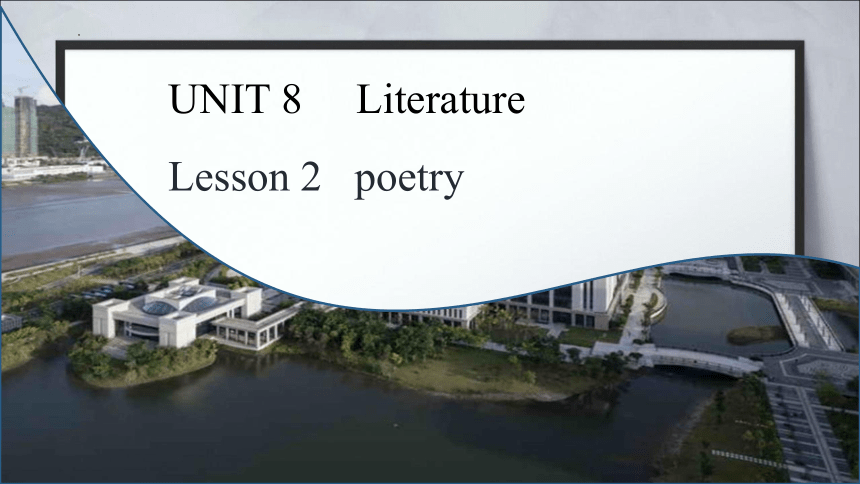
|
|
| 格式 | pptx | ||
| 文件大小 | 4.2MB | ||
| 资源类型 | 教案 | ||
| 版本资源 | 北师大版(2019) | ||
| 科目 | 英语 | ||
| 更新时间 | 2022-11-14 16:35:33 | ||
图片预览


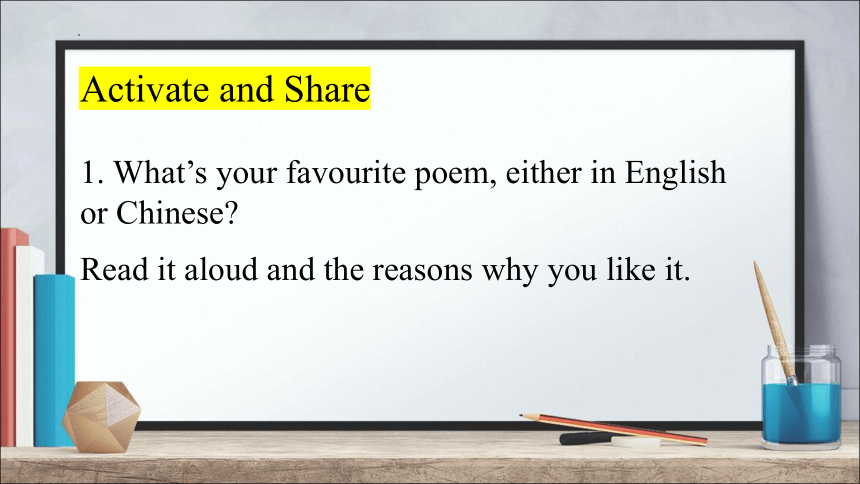
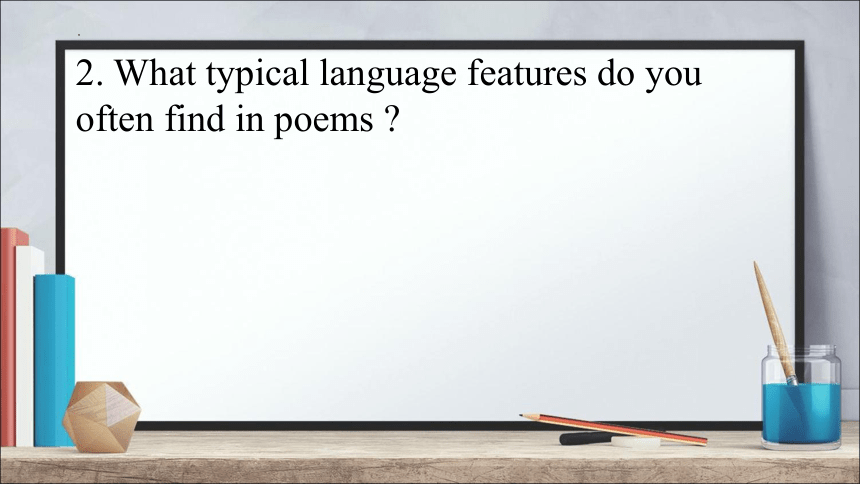


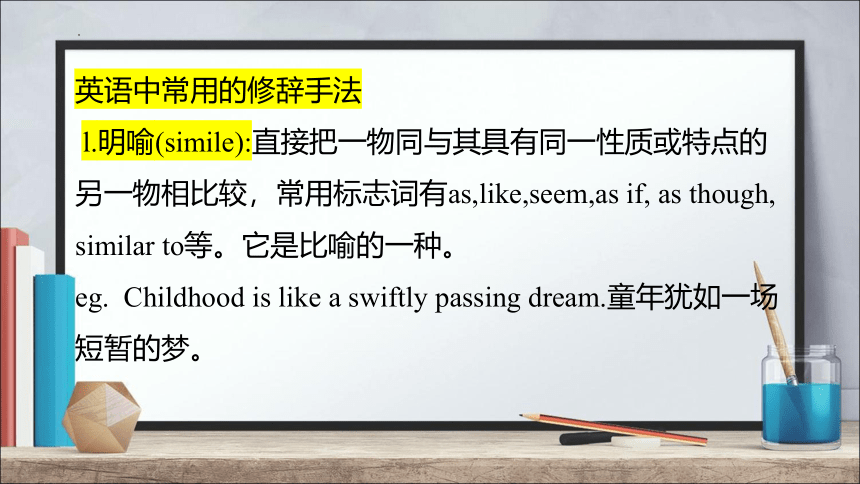

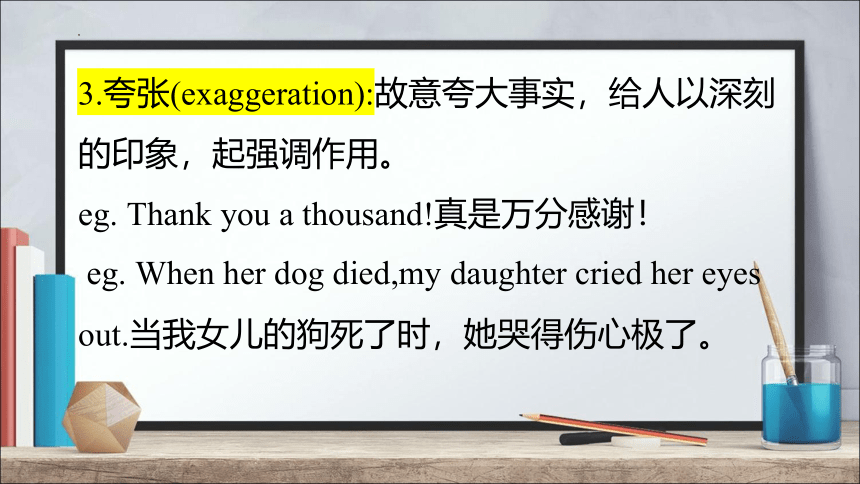

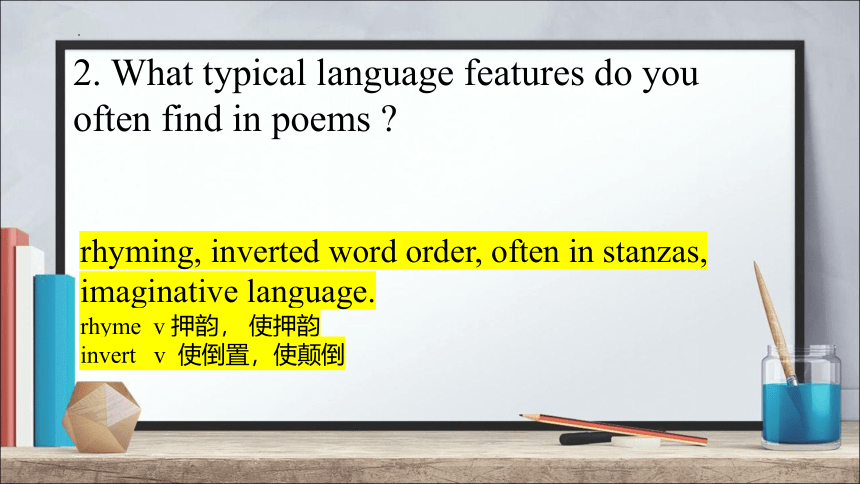

文档简介
(共42张PPT)
UNIT 8 Literature
Lesson 2 poetry
课本+练习题
Activate and Share
1. What’s your favourite poem, either in English or Chinese
Read it aloud and the reasons why you like it.
2. What typical language features do you often find in poems
Skill Builder
Understanding Poetry
Poetry is a form of literature that is usually written in lines and stanzas.(stanza n. 演出期;局;场;诗的一节)
Skill Builder
Understanding Poetry
Words in a poem are put in a special way to make a rhythmn. (韵律,节拍)( (a regular repeated pattern of sounds).The theme of a poem is often shown
by images and through literary devices(文学手法) ( e.g. simile, personification, metaphor, exaggeration).
英语中常用的修辞手法
l.明喻(simile):直接把一物同与其具有同一性质或特点的另一物相比较,常用标志词有as,like,seem,as if, as though, similar to等。它是比喻的一种。
eg. Childhood is like a swiftly passing dream.童年犹如一场短暂的梦。
2.暗喻(metaphor):间接地把一物同与其具有某种相似点的另一物相比较,更生动、更深刻地说明事理,增 强语言的表现力,不用比喻词。它也是比喻的一种。
eg. Since your ship was first launched upon the sea of life,you have never been still for a single moment.自从你 驶入人生的海洋,你的航船便没有片刻停歇。
3.夸张(exaggeration):故意夸大事实,给人以深刻的印象,起强调作用。
eg. Thank you a thousand!真是万分感谢!
eg. When her dog died,my daughter cried her eyes out.当我女儿的狗死了时,她哭得伤心极了。
4.拟人(personification):把非人的事物当作人来写,把人的特点赋予事物或某种抽象概念使语言生动形 象,更有感染力。
eg. She watched the moonlight dancing on the lake.她看着月光在湖面上闪烁。
2. What typical language features do you often find in poems
rhyming, inverted word order, often in stanzas, imaginative language.
rhyme v 押韵, 使押韵
invert v 使倒置,使颠倒
Stopping by woods on a snowy Evening雪夜林畔小驻
Whose woods these are I think I know.
His house is in the village though;
He will not see me stopping here
To watch his woods fill up with snow.
我想我认得这座森林,林主的房子就在前村;
却看不见我在此歇马,看他林中飘满的雪景。
by Robert Frost (Amerian,1874-1963) 罗伯特. 佛罗斯特
My little horse must think it queer
To stop without a farmhouse near
Between the woods and frozen lake
The darkest evening of the year.
我的小马一定很惊讶,周围望不见什么人家,
竟在一年最暗的黄昏,寒林和冰湖之间停下。
He gives his harness bells a shake
To ask if there is some mistake.
The only other sound’s the sweep
of easy wind and downy flake
马儿摇响身上的串铃,问我这地方该不该停;
此外只有轻风拂雪片,再也听不见其他声音。
The woods are lovely, dark and deep,
But I have promised to keep,
And miles to go before I sleep,
And miles to go before I sleep.
森林又暗又深真可羡,但是我已经有约在先,
还要赶多少路才安眠,还要赶多少路才安眠。
5. Listen to the poem. Answer the questions .
1). Why did the writer stop by the woods
He wanted to watch the snow falling in the woods.
5. Listen to the poem. Answer the questions .
2). Why did the horse give the harness bells a shake
The horse was unsure why they had stopped without a barn nearby.
5. Listen to the poem. Answer the questions .
3). Why couldn’t the writer stay longer in the woods
The writer couldn't stay because he needed to keep going on his journey and he had many more miles left to travel.
6. Group Work What is the effect of the repetition in the last lines of the poem
Answer:
The writer repeats the last line to show how sad the speaker feels.He cannot stop and must continue on his long journey.
The Daffodils(水仙花)
by William Wordsworth (English, 1770 -1850 Lake poets)
人物小传
威廉·华兹华斯(William Wordsworth),英国浪漫主义诗人,文艺复兴运动以来最重要的英国诗人之一,曾是桂冠诗人。其诗歌理论动摇了英国古典主义诗学的统治,有力地推动了英国诗歌的革新和浪漫主义运动的发展。
I wandered lonely as a cloud,
That floats on high o’er vales and hills,
When all at once I saw a crowd,
A host, of golden daffodils;
Beside the lake, beneath the trees,
Fluttering and dancing in the breeze.
我好似一朵孤独的流云,高高地飘游在山谷之上,
突然我看到一大片鲜花,是金色的水仙遍地开放;
它们开在湖畔,开在树下,它们随风嬉舞,随风飘荡。
Continuous as the stars that shine,
And twinkle on the milky way,
They stretched in never-ending line,
Along the margin of a bay;
Ten thousand saw I at a glance,
Tossing their heads in springtly dance.
它们密集如银河的星星,像群星在闪烁一片晶莹,
它们沿着海湾向前伸展,通往远方仿佛无穷无尽:
一眼看去就有千朵万朵,万花摇首舞得多么高兴。
The waves beside them danced; but they
outdid the sparkling waves in glee:
A poet could not but be gay,
In such a jocund company:
I gazed -and-gazed--but little thought,
What wealth the show to me had brought:
粼粼湖波也在近旁欢跳,却不如这水仙舞得轻俏:
诗人遇见这快乐的旅伴,又怎能不感到欢欣雀跃:
我久久凝视——却未领悟,这景象所给我的精神至宝:
For oft, when on my couch I lie,
In vacant or in pensive mood,
They flash upon that inward eye,
which is the bliss of solitude;
And then my heart with pleasure fills,
And dances with the daffodils.
后来多少次我郁郁独卧,感到百无聊赖心灵空漠,
这景象便在脑海中闪现,多少次安慰过我的寂寞;
我的心又随水仙跳起舞来,我的心又重新充满了欢乐。
8 Listen to the poem.Answer the questions.
1) How did the poet feel before he saw the daffodils How did he feel afterwards What is the poet's mood in the poem
1.Before the poet saw the daffodils,he felt lonely. Afterwards, he felt companionship from the flowers.The poet's mood in the poem is happy and positive.
8 Listen to the poem.Answer the questions.
2 )What wealth did the daffodils bring to the writer
2.The experience provided him a memory that helped him when he was alone or in a blue mood.
8 Listen to the poem.Answer the questions.
3) How is the beauty of the daffodils depicted in the poem
3.The poet depicts the beauty of the daffodils by describing how they look and move.
10. Read the two poems again. Underline and talk about the literary devices the two poets used to express their feelings.
Suggested Answers
Stopping by Woods on a Snowy Evening personification--He gives his harness bells a shake alliteration--The woods are lovely,dark and deep repetition-And miles to go before I sleep
The Daffodils
alliteration--Beside the lake,beneath the trees simile--I wondered lonely as a cloud personification--Fluttering and dancing in the breeze exaggeration-Continuous as the stars that shine
alliterationn. 头韵,头韵法(相连单词的开头使用同样的字母或语音)
课本47页3. Chen Xi then reads to the class an extract from one of his favourite fantasy books about a princess who lives in a world inhabited by dangerous creatures.Read the extract and identify the different literary devices used in the underlined parts.
simile metaphor exaggeration personification
1 The wind moaned through the trees as she wandered lost and lonely through the forest.
moan v. 呻吟,呜咽;
personification
It was 2 as dark as a long winter night without moon or stars. Her 3 fear rose like waves in the ocean.Her 4 breath was icicles in the freezing air.
icicle n. 冰柱;垂冰;冷冰冰的人
3 simile
2 simile
4 metaphor
Suddenly, through the forest rose a shadow. She screamed in fear. Dark, dangerous and 5 larger than the highest mountain, it crept towards her. She fled ..
crept v. 匍匐爬行(creep 的过去式)
fled v. 逃走(flee 的过去分词);消逝
5. exaggeration
课本83页2. Lesson 2 Use the correct form of the words below to replace the words or phrases in italics in the text.
era bay poet tone rhyme frozen dramatic continuous emphasis collection
My advice to anyone hoping to become a writer or a I person who writes poetry, is to listen to your emotions and feelings as much as possible.
1. poet
Getting out and about in nature is also highly recommended. You never know what kind of feelings and words,a walk near a 2 chilled lake or a 3 place where the sea curves into the land can bring to mind.
2. frozen
3. bay
Most people think that poetry must always 4 have words that end with the same sound but that's not the case. However, many poems do have a(n)5 ongoing flow of words which are smooth and enjoyable for the reader.
4. rhyme
5. continuous
On the other hand, some poems are structured so that there is 6 particular attention on some words and not others. I recommend reading some 7 groups of similar works of poetry from famous poets from different 8 times in history.
.
6. emphasis
7.collections
8. eras
It's amazing to see how similar people have felt about life and love, despite hundreds of years between them.
For writers,there are also key skills to learn, such as how to develop interesting characters and deciding on a 9 style or feeling. If you're writing 10 emotional and powerful pieces,it's important to keep the audience interested and excited about what might happen next.
9. tone
10 dramatic
UNIT 8 Literature
Lesson 2 poetry
课本+练习题
Activate and Share
1. What’s your favourite poem, either in English or Chinese
Read it aloud and the reasons why you like it.
2. What typical language features do you often find in poems
Skill Builder
Understanding Poetry
Poetry is a form of literature that is usually written in lines and stanzas.(stanza n. 演出期;局;场;诗的一节)
Skill Builder
Understanding Poetry
Words in a poem are put in a special way to make a rhythmn. (韵律,节拍)( (a regular repeated pattern of sounds).The theme of a poem is often shown
by images and through literary devices(文学手法) ( e.g. simile, personification, metaphor, exaggeration).
英语中常用的修辞手法
l.明喻(simile):直接把一物同与其具有同一性质或特点的另一物相比较,常用标志词有as,like,seem,as if, as though, similar to等。它是比喻的一种。
eg. Childhood is like a swiftly passing dream.童年犹如一场短暂的梦。
2.暗喻(metaphor):间接地把一物同与其具有某种相似点的另一物相比较,更生动、更深刻地说明事理,增 强语言的表现力,不用比喻词。它也是比喻的一种。
eg. Since your ship was first launched upon the sea of life,you have never been still for a single moment.自从你 驶入人生的海洋,你的航船便没有片刻停歇。
3.夸张(exaggeration):故意夸大事实,给人以深刻的印象,起强调作用。
eg. Thank you a thousand!真是万分感谢!
eg. When her dog died,my daughter cried her eyes out.当我女儿的狗死了时,她哭得伤心极了。
4.拟人(personification):把非人的事物当作人来写,把人的特点赋予事物或某种抽象概念使语言生动形 象,更有感染力。
eg. She watched the moonlight dancing on the lake.她看着月光在湖面上闪烁。
2. What typical language features do you often find in poems
rhyming, inverted word order, often in stanzas, imaginative language.
rhyme v 押韵, 使押韵
invert v 使倒置,使颠倒
Stopping by woods on a snowy Evening雪夜林畔小驻
Whose woods these are I think I know.
His house is in the village though;
He will not see me stopping here
To watch his woods fill up with snow.
我想我认得这座森林,林主的房子就在前村;
却看不见我在此歇马,看他林中飘满的雪景。
by Robert Frost (Amerian,1874-1963) 罗伯特. 佛罗斯特
My little horse must think it queer
To stop without a farmhouse near
Between the woods and frozen lake
The darkest evening of the year.
我的小马一定很惊讶,周围望不见什么人家,
竟在一年最暗的黄昏,寒林和冰湖之间停下。
He gives his harness bells a shake
To ask if there is some mistake.
The only other sound’s the sweep
of easy wind and downy flake
马儿摇响身上的串铃,问我这地方该不该停;
此外只有轻风拂雪片,再也听不见其他声音。
The woods are lovely, dark and deep,
But I have promised to keep,
And miles to go before I sleep,
And miles to go before I sleep.
森林又暗又深真可羡,但是我已经有约在先,
还要赶多少路才安眠,还要赶多少路才安眠。
5. Listen to the poem. Answer the questions .
1). Why did the writer stop by the woods
He wanted to watch the snow falling in the woods.
5. Listen to the poem. Answer the questions .
2). Why did the horse give the harness bells a shake
The horse was unsure why they had stopped without a barn nearby.
5. Listen to the poem. Answer the questions .
3). Why couldn’t the writer stay longer in the woods
The writer couldn't stay because he needed to keep going on his journey and he had many more miles left to travel.
6. Group Work What is the effect of the repetition in the last lines of the poem
Answer:
The writer repeats the last line to show how sad the speaker feels.He cannot stop and must continue on his long journey.
The Daffodils(水仙花)
by William Wordsworth (English, 1770 -1850 Lake poets)
人物小传
威廉·华兹华斯(William Wordsworth),英国浪漫主义诗人,文艺复兴运动以来最重要的英国诗人之一,曾是桂冠诗人。其诗歌理论动摇了英国古典主义诗学的统治,有力地推动了英国诗歌的革新和浪漫主义运动的发展。
I wandered lonely as a cloud,
That floats on high o’er vales and hills,
When all at once I saw a crowd,
A host, of golden daffodils;
Beside the lake, beneath the trees,
Fluttering and dancing in the breeze.
我好似一朵孤独的流云,高高地飘游在山谷之上,
突然我看到一大片鲜花,是金色的水仙遍地开放;
它们开在湖畔,开在树下,它们随风嬉舞,随风飘荡。
Continuous as the stars that shine,
And twinkle on the milky way,
They stretched in never-ending line,
Along the margin of a bay;
Ten thousand saw I at a glance,
Tossing their heads in springtly dance.
它们密集如银河的星星,像群星在闪烁一片晶莹,
它们沿着海湾向前伸展,通往远方仿佛无穷无尽:
一眼看去就有千朵万朵,万花摇首舞得多么高兴。
The waves beside them danced; but they
outdid the sparkling waves in glee:
A poet could not but be gay,
In such a jocund company:
I gazed -and-gazed--but little thought,
What wealth the show to me had brought:
粼粼湖波也在近旁欢跳,却不如这水仙舞得轻俏:
诗人遇见这快乐的旅伴,又怎能不感到欢欣雀跃:
我久久凝视——却未领悟,这景象所给我的精神至宝:
For oft, when on my couch I lie,
In vacant or in pensive mood,
They flash upon that inward eye,
which is the bliss of solitude;
And then my heart with pleasure fills,
And dances with the daffodils.
后来多少次我郁郁独卧,感到百无聊赖心灵空漠,
这景象便在脑海中闪现,多少次安慰过我的寂寞;
我的心又随水仙跳起舞来,我的心又重新充满了欢乐。
8 Listen to the poem.Answer the questions.
1) How did the poet feel before he saw the daffodils How did he feel afterwards What is the poet's mood in the poem
1.Before the poet saw the daffodils,he felt lonely. Afterwards, he felt companionship from the flowers.The poet's mood in the poem is happy and positive.
8 Listen to the poem.Answer the questions.
2 )What wealth did the daffodils bring to the writer
2.The experience provided him a memory that helped him when he was alone or in a blue mood.
8 Listen to the poem.Answer the questions.
3) How is the beauty of the daffodils depicted in the poem
3.The poet depicts the beauty of the daffodils by describing how they look and move.
10. Read the two poems again. Underline and talk about the literary devices the two poets used to express their feelings.
Suggested Answers
Stopping by Woods on a Snowy Evening personification--He gives his harness bells a shake alliteration--The woods are lovely,dark and deep repetition-And miles to go before I sleep
The Daffodils
alliteration--Beside the lake,beneath the trees simile--I wondered lonely as a cloud personification--Fluttering and dancing in the breeze exaggeration-Continuous as the stars that shine
alliterationn. 头韵,头韵法(相连单词的开头使用同样的字母或语音)
课本47页3. Chen Xi then reads to the class an extract from one of his favourite fantasy books about a princess who lives in a world inhabited by dangerous creatures.Read the extract and identify the different literary devices used in the underlined parts.
simile metaphor exaggeration personification
1 The wind moaned through the trees as she wandered lost and lonely through the forest.
moan v. 呻吟,呜咽;
personification
It was 2 as dark as a long winter night without moon or stars. Her 3 fear rose like waves in the ocean.Her 4 breath was icicles in the freezing air.
icicle n. 冰柱;垂冰;冷冰冰的人
3 simile
2 simile
4 metaphor
Suddenly, through the forest rose a shadow. She screamed in fear. Dark, dangerous and 5 larger than the highest mountain, it crept towards her. She fled ..
crept v. 匍匐爬行(creep 的过去式)
fled v. 逃走(flee 的过去分词);消逝
5. exaggeration
课本83页2. Lesson 2 Use the correct form of the words below to replace the words or phrases in italics in the text.
era bay poet tone rhyme frozen dramatic continuous emphasis collection
My advice to anyone hoping to become a writer or a I person who writes poetry, is to listen to your emotions and feelings as much as possible.
1. poet
Getting out and about in nature is also highly recommended. You never know what kind of feelings and words,a walk near a 2 chilled lake or a 3 place where the sea curves into the land can bring to mind.
2. frozen
3. bay
Most people think that poetry must always 4 have words that end with the same sound but that's not the case. However, many poems do have a(n)5 ongoing flow of words which are smooth and enjoyable for the reader.
4. rhyme
5. continuous
On the other hand, some poems are structured so that there is 6 particular attention on some words and not others. I recommend reading some 7 groups of similar works of poetry from famous poets from different 8 times in history.
.
6. emphasis
7.collections
8. eras
It's amazing to see how similar people have felt about life and love, despite hundreds of years between them.
For writers,there are also key skills to learn, such as how to develop interesting characters and deciding on a 9 style or feeling. If you're writing 10 emotional and powerful pieces,it's important to keep the audience interested and excited about what might happen next.
9. tone
10 dramatic
